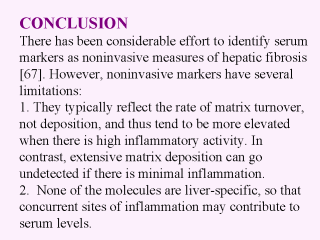 |
3. Serum levels are affected
by clearance rates, which may be impaired either due to sinusoidal endothelial cell
dysfunction or impaired biliary excretion
(for details, see Friedman SL, Mount Sinai School of
Medicine, www.uptodate.com/patient_info/topicpages/topics/Cirrhosi/9999.asp#13).
While their accuracy and predictive value of non-invasive markers
are improving, they cannot yet supplant direct analysis of liver. Individual serum
fibrosis markers have limited accuracy in predicting hepatic fibrosis [49]. Indices
composed of a panel of markers correlate better with histological fibrosis, but their
reliability requires further validation [49, 69]. They can indicate tendency of hepatic
fibrosis, but it cannot replace liver biopsy. There remains a compelling need for more of
the efficient noninvasive markers that in combinations, by complex scoring, would
accurately reflect the biochemistry of liver function and matrix content of tissue and,
thus, have a better prognostic accuracy than standard clinical and laboratory indices. |
